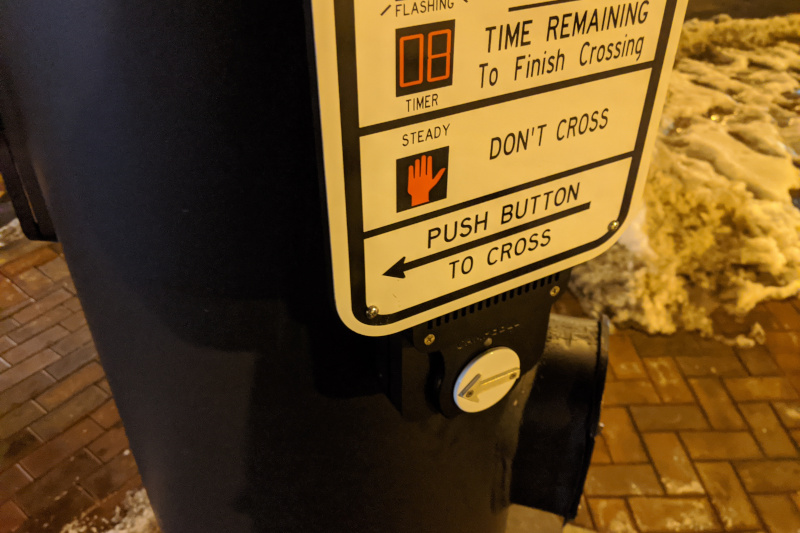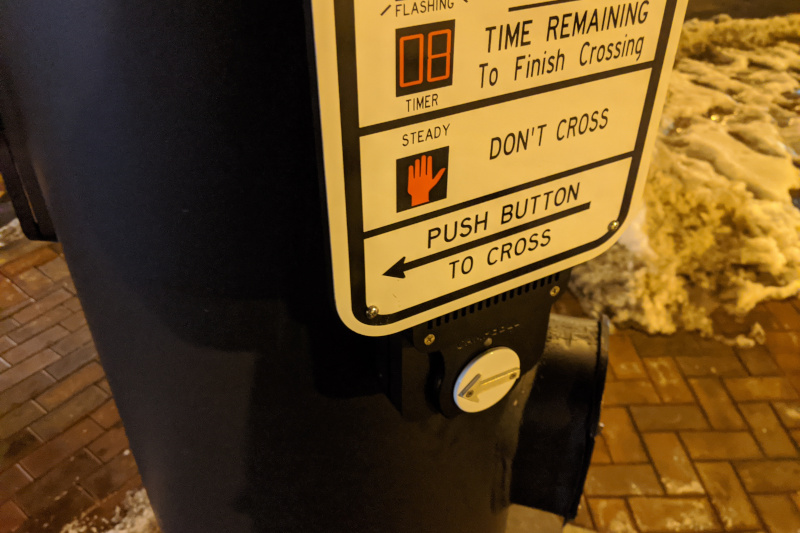Pedestrians following to law to avoid threatened $92 fines have to take up to four minutes to cross a prominent New Britain street corner.
New Britain police have distributed a warning notice telling pedestrians that they could be fined $92 if they, “failed to obey signals and use the crosswalk correctly,” including in the case of a pedestrian crossing diagonally, from one corner to the other, while a “walk” signal is showing.
But it takes up to four full minutes to legally walk from one corner of the intersection of Main Street and Myrtle Street to the opposite corner, raising questions about the effects of a combination of street and crosswalk engineering and laws on pedestrian street crossing.
While the warning notice is ostensibly directed at both motorists and pedestrians, most of the notice emphasizes rules which apply to pedestrians, not motorists. The notice card appears to have been created by the state Department of Transportation.
The notice appears to says that pedestrians can only start crossing when, “a traffic signal shows a steady ‘Walk’ or a walking person,” but not, “when crossing signals display a countdown showing remaining time left to cross.” The notice appears to say that pedestrians already in the crosswalk when the signal, “shows a steady ‘Walk’ or a walking person,” can continue to cross until they reach the other side of the road.

The New Haven Independent has recently reported on New Haven police issuing not only similar warnings, but fines, as well. The article even noted that New Haven officers prepared for doing so, “with eight hours of training at the New Britain police academy, on the state’s pertaining statutes.”
The New Haven Independent noted that in the first week of the new program, officially directed at both motorists and pedestrians, “123 formal warnings were written, 102 for pedestrians crossing at angles or at non-crosswalk situations; five for cyclists; and 16 for motorists,” adding that, once fines started being issued, police conceded “that it is obviously harder to catch drivers in violations,” than pedestrians or cyclists.
New Haven police writing $92 tickets pedestrians, the New Haven Independent reported, ended, “Hours after a New Haven Independent article unleashed an avalanche of public criticism.”
The New Haven Independent also published an opinion piece by, “Carolyn Lusch, an urban planner, and Neil Olinski, a transportation planner/engineer,” who sharply criticized ticketing of pedestrians. Lusch and Olinski questioned whether enforcement action on pedestrians has any positive effect on traffic safety.
Lusch and Olinski wrote that, “As historian Peter Norton details in his book ‘Fighting Traffic,’ the offense of ‘jaywalking’ was concocted by automotive interests in the early 1900s to deflect public outrage away from the massive loss of life associated with early motor vehicle use in American cities.”
Lusch and Olinski also wrote that,
Ticketing pedestrians for ‘jaywalking’ creates opportunities for bias and error. An analysis by the Florida Times-Union and ProPublica of five years of pedestrian ticketing in Jacksonville found that African-Americans were three times as likely to be ticketed for a pedestrian infraction, and residents of the poorest neighborhoods were likewise over-represented.
“Clearly everyone wants to see the same outcome – fewer traffic deaths and injuries on our streets – but there are much more effective ways to work towards this goal,” Lusch and Olinski wrote, adding that, “appropriate street design is the key to greatly reduce speeding in cities, and slowing down cars saves lives.”




